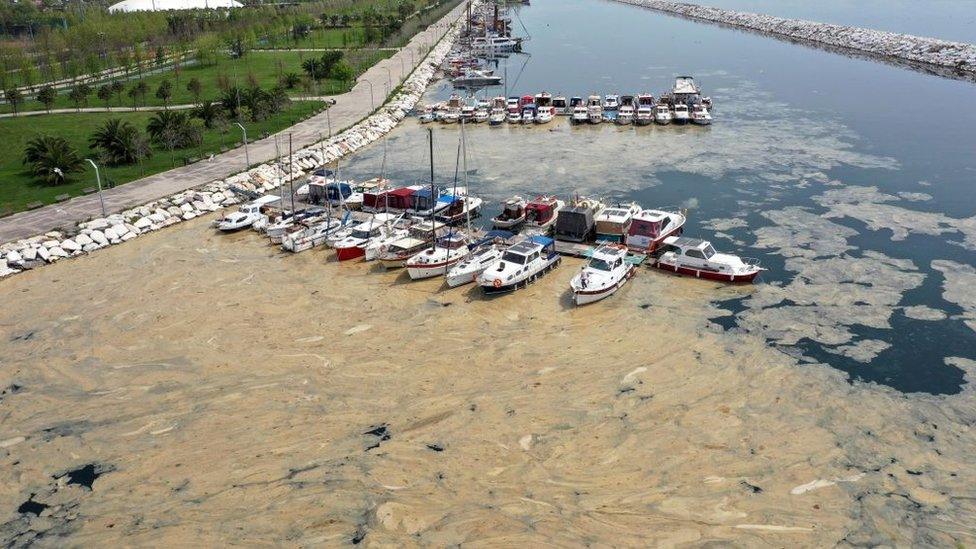'Sea snot' affecting waters in Turkey
- Published
- comments

The substance's rapid spread has been linked to climate change
A thick sticky substance has been spotted spreading across the Sea of Marmara in Turkey.
It's been described as 'sea snot' and scientists warn it could be increasing because of climate change.
The sea snot hadn't been in the Sea of Marmara before 2007 and it's been increasing rapidly over the last six months. Scientists worry it could pose a big problem to sea life and they believe it could also affect humans in the future.
What's causing the 'sea snot'?
Well, it's believed the substance is produced by phytoplankton, which are tiny organisms that live in water.
Phytoplankton can rapidly increase in number when key nutrients such as nitrogen and phosphorus become widely available in seawater. This can be caused when nutrient-rich untreated sewage flows into it and it's also affected by consistently warm temperatures.
The Sea of Marmara has been filled with these nutrients as it receives the wastewater of nearly 20 million people and this is fed directly from the Black Sea.
In normal amounts, these microorganisms produce oxygen which ends up being released into the oceans. However, their overpopulation has the opposite unwelcomed effect. Under conditions of stress, they process a mucus-like matter that can grow to cover many square miles of the sea in the right conditions.
Phytoplankton, which is also known as microalgae, are microscopic organisms that live in watery environments, both salty and fresh water.
Much like the plants we have on land, phytoplankton have chlorophyll to capture sunlight, and they use photosynthesis to turn it into energy.
Phytoplankton consume carbon dioxide, and release oxygen. All phytoplankton photosynthesize, but some get additional energy by consuming other organisms.
Nutrient-rich wastewater has been flowing directly into the sea
Generally, the substance produced by phytoplankton isn't harmful.
Dr Neslihan Özdelice, who is a marine biologist at Istanbul University, told the Guardian newspaper: "What we see is basically a combination of protein, carbohydrates and fat."
However, it can attract viruses and bacteria which can pose a threat to marine life.
"The gravity of the situation set in when I dived for measurements in March and discovered severe mortality in corals," said Dr Barış Özalp, another marine biologist investigating the sea snot.
Dr Özalp saw the extent of the sea snot during his regular dives to monitor corals months ago. He warned that if the sea snot were to continue to spread, invertebrate life at the bottom of the sea could be in great danger.
Since the substance has reached the shoreline in recent months, it's also started to threaten the breeding ground of fish.
The sea snot from the phytoplankton could lead to some big problems for humans too, as it makes it impossible for people to fish or swim in the waters.
Scientists are calling for action to be taken to help reduce wastewater pressures on the Sea of Marmara
Scientists are now calling for important actions to be taken to help reduce wastewater pressures on the Sea of Marmara in order to reduce the nutrients available to the phytoplankton.
"The main trigger is warming related to climate change, as phytoplankton grow during higher temperatures," said Dr Özdelice, adding that the seawater had warmed by 2-3 degrees celsius since pre-industrial times.
"This is also an outcome of overfishing because as filter feeders which consume phytoplankton are excessively hunted, it allows room for [phytoplankton and sea snot] to breed."
"We are experiencing the visible effects of climate change, and adaptation requires an overhaul of our habitual practices. We must initiate a full-scale effort to adapt."
- Published22 January 2020
- Published24 April 2019
- Published15 January 2021
